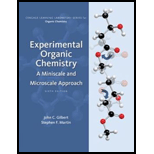
(a)
Interpretation:
The term stationary phase should be defined.
Concept Introduction:
Gas liquid chromatography (GLC) or else gas chromatography (GC) is a sensitive chromatographic technique which used to analyze mixtures of volatile components whose boiling points may differ by as little as
(b)
Interpretation:
The term mobile phase should be defined.
Concept Introduction:
Gas liquid chromatography (GLC) or else gas chromatography (GC) is a sensitive chromatographic technique which used to analyze mixtures of volatile components whose boiling points may differ by as little as
(c)
Interpretation:
Carrier gas should be defined.
Concept Introduction:
Gas liquid chromatography (GLC) or else gas chromatography (GC) is a sensitive chromatographic technique which used to analyze mixtures of volatile components whose boiling points may differ by as little as
(d)
Interpretation:
Retention time should be defined.
Concept Introduction:
Gas liquid chromatography (GLC) or else gas chromatography (GC) is a sensitive chromatographic technique which used to analyze mixtures of volatile components whose boiling points may differ by as little as
(e)
Interpretation:
Solid support should be defined.
Concept Introduction:
Gas liquid chromatography (GLC) or else gas chromatography (GC) is a sensitive chromatographic technique which used to analyze mixtures of volatile components whose boiling points may differ by as little as
(f)
Interpretation:
Thermal conductivity should be defined.
Concept Introduction:
Gas liquid chromatography (GLC) or else gas chromatography (GC) is a sensitive chromatographic technique which used to analyze mixtures of volatile components whose boiling points may differ by as little as
Want to see the full answer?
Check out a sample textbook solution
Chapter 6 Solutions
Experimental Organic Chemistry: A Miniscale & Microscale Approach (Cengage Learning Laboratory Series for Organic Chemistry)
- Draw an example of the following functional groups: *see imagearrow_forwardAldehydes and Ketones: Show the reaction conditions, and molecules, that connect the reactant to the product. A protecting group will be needed. *see imagearrow_forwardAldehydes and Ketones: Show the reaction conditions, and molecules, that connect the reactant to the product. *see imagearrow_forward
- Provide the missing information for each of the four reactions: *see imagearrow_forward6. Chlorine dioxide (CIO) is used as a disinfectant in municipal water-treatment plants. It decomposes in a first-order reaction with a rate constant of 14 s. How long would it take for an initial concentration of 0.06 M to decrease to 0.02 M? [6 pts]arrow_forwardIf possible, replace an H atom on the a carbon of the molecule in the drawing area with a methyl group substituent, and replace an H atom on the ẞ carbon with a hydroxyl group substituent. If one of the substituents can't be added for any reason, just don't add it. If neither substituent can be added, check the box under the drawing area. en HO OHarrow_forward
- Curved arrows are used to illustrate the flow of electrons. Use the reaction conditions provided and follow the curved arrows to draw the intermediate and product of this hydrohalogenation reaction. Include all lone pairs and charges as appropriate. Br Select to Draw 51°F Sunny esc F1 HBr Select to Draw 1,2-hydride shift Br Select to Draw Q Search F2 F3 F4 1 2 # # 3 DII L F5 F6 F tA $ % Λarrow_forwardplease help i cant find the article to even startarrow_forwardWhat are the missing reagents for the spots labeled 1 and 3? Please give a detailed explanation and include the drawings and show how the synthesis proceeds with the reagents.arrow_forward
- help with the rf values i am so confusedarrow_forwardPredict the organic reactant of X and Y that are involved in the reaction below, and draw the skeletal ("line") structures of the missing organic reactant. Please include all steps & drawings & explanations.arrow_forwardPredict the major organic product for this reaction.arrow_forward
- Chemistry: Matter and ChangeChemistryISBN:9780078746376Author:Dinah Zike, Laurel Dingrando, Nicholas Hainen, Cheryl WistromPublisher:Glencoe/McGraw-Hill School Pub Co
